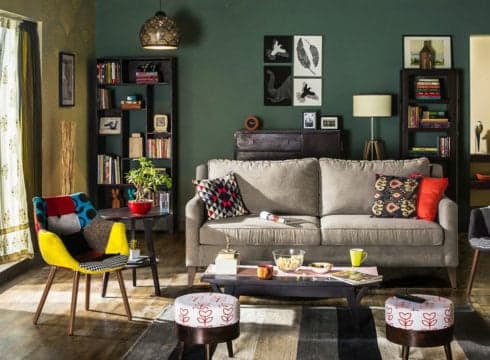Urban Ladder Shifted Its Business Model From Online Retail To Offline In September 2016
Inc42 Daily Brief
Stay Ahead With Daily News & Analysis on India’s Tech & Startup Economy
Urban ladder, which earlier dealt in online retail of furniture, has received a Single Brand Retail Trade (SBRT) licence from the Department of Industrial Policy & Promotion (DIPP).
Update: Recently in 2018, Urban ladder raised $12 Mn funding for omni-channel expansion.
Urban Ladder had applied for the single brand licence in September last year when it announced a shift in its business model from online retail to becoming a furniture brand. The company also launched its first experience centre in Bengaluru earlier this year, which will now be converted into an offline retail store.
As stated by Ashish Goel, CEO and co-founder of Urban Ladder to ET, “The SBRT licence given by DIPP is a huge vote of confidence and encouragement from the government to young, Indian companies like ours. This licence helps us at Urban Ladder to build a brand that can pursue its ambitions as well as help shape the economy impactfully.”
Founded in 2012 by Ashish Goel and Rajiv Srivastava, the Urban Ladder team now aims to be profitable in the next 18 to 20 months and file an IPO within three years.
Offline Retail Versus Online Retail: What The DIPP Nod Means For Urban Ladder
A recent Livemint report highlighted the struggle online furniture retailers were facing over the last few months, thereby, forcing them to invest heavily in offline retail.
According to consulting firm RedSeer Management Consulting Pvt. Ltd, furniture comprised only 1-1.5% of the total online retail sales in 2016. Furthermore, with lesser revenues, riding on investor money becomes the sole option for a majority of the online furniture retailers, making them a close target for potential consolidation by bigger firms.
While online retail comes with its benefits of personalisation, consultation service, advance payments, etc., online furniture marketplaces face difficulties in creating a frequent repeat customer base due to large ticket size of the sold items.
Furthermore, the furniture segment in India is still highly unorganised and is dominated by offline players as well as local carpenters. As per a recent report by Ken Research, “The Indian furniture market, which has grown at a CAGR of 17.2% for the period FY08-FY13, will incline at a compounded annual rate of 13.0% from FY13-FY18.”
Thus, as specified by analysts in various media reports, the single brand licence will give Urban Ladder “more flexibility with its designs and product sourcing”. This will certainly help the furniture retailer tighten its grip on its supply chain and maintaining healthy inventory.
Urban Ladder: A Glimpse Of Current Market Positioning And Existing Competition
Urban Ladder currently offers over 4,000 products across various furniture categories including wardrobes, beds, sofas, dining tables, and coffee tables. It is one of the most well-capitalised online furniture businesses, backed by Ratan Tata, Sequoia Capital, Steadview Capital, SAIF Partners, and Kalaari Capital. The founders recently raised $15 Mn in February 2017, from Kalaari, SAIF and others, raising the total funding to date to $95 Mn.
With the shift in the business model in September 2016, Urban Ladder also started laying the groundwork to establish itself as a furniture brand. As Inc42 reported earlier, the company started partnering with players like Flipkart, Amazon, GoZefo and more. “Our idea was always to function as a brand, and not as a marketplace. Right now, we feel that the brand is large enough and has the strength to expand into different ventures,” said Sanjay Gupta, then CMO of Urban Ladder (now Head of Marketing at Uber) at the time of the announcement.
Urban Ladder has to compete with a few major players such as Pepperfry, Furlenco, and Fabfurnish in the furniture etailer space. While Kishore Biyani-led Future Group acquired Rocket Internet-backed online furniture startup FabFurnish in April 2016, Pepperfry and Furlenco are still climbing the success ladder on the back of investor funding.
Pepperfry has so far raised $128 Mn from investors such as Goldman Sachs, Norwest Venture Partners, and Bertelsmann India Investments, among others. Also, the company is investing heavily in offline retail with a focus to open 46 studios by March 2018.
On the other hand, Furlenco raised $30 Mn (INR 200 Cr) in a Series B round in October 2016. Rentomojo, which is founded by IIT Madras graduates, is another startup dealing in this space but is following a marketplace approach.
With its bet on the offline furniture segment, Urban Ladder will be again playing for the top position amidst a few renowned names in the industry. In the organised retail segment, the market is occupied by leading Indian companies such as Godrej Interio, Home centre, Nilkamal, Durian Furniture, Style Spa among others. All these companies have grabbed a major market share and have worked hard over years to build brand value amidst their targeted consumer groups. News also surfaced that Swedish furniture giant Ikea will be opening its store in Hyderabad in early 2018, again a major threat for new entrants in the offline retail in the furniture space.
So far, Urban Ladder has been able to convince its investors about the potential of the online retail model in the furniture space. But, now, with its offline retail model, will it be able to rise up to their expectations? Will Urban Ladder be able to fend off such high competition in the offline retail world and establish itself as the brand name? Will the company be able to improve upon its financials or will the game be played again on investor money? These are some questions that we are still finding answers to.
{{#name}}{{name}}{{/name}}{{^name}}-{{/name}}
{{#description}}{{description}}...{{/description}}{{^description}}-{{/description}}
Note: We at Inc42 take our ethics very seriously. More information about it can be found here.


